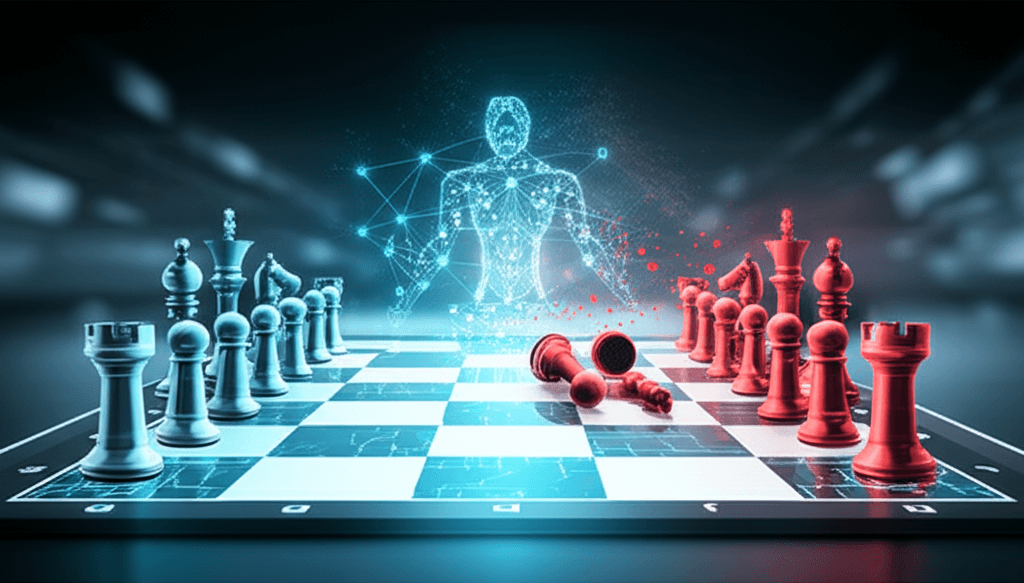Altman's OpenAI o3 Masterfully Defeats Musk's xAI Grok 4 in Chess Showdown
OpenAI's o3 delivers a crushing 4-0 defeat to xAI's Grok 4, showcasing general-purpose AI's diverse strategic reasoning.
August 8, 2025

In a decisive display of strategic reasoning, OpenAI's o3 model has claimed victory in the Kaggle AI Chess Exhibition Tournament, delivering a crushing 4-0 defeat to xAI's Grok 4 in the final match. The tournament, hosted on Google's Kaggle Game Arena, was a landmark event designed to test the critical thinking and strategic judgment of general-purpose large language models (LLMs) outside of traditional benchmarks. OpenAI's o3 navigated the entire competition without a single loss, showcasing a level of chess acumen that, while not on par with specialized chess engines, significantly outclassed its opponent and has stirred conversation about the evolving capabilities of generative AI. The final, which pitted the models of two of the most prominent figures in AI, Sam Altman and Elon Musk, against each other, concluded with a one-sided performance that highlighted the current differences in their strategic problem-solving abilities.
The Kaggle AI Chess Tournament was a unique experiment, moving beyond standardized tests to evaluate how well leading AI models could handle the complex, dynamic environment of a chess game.[1] Eight models from global AI leaders participated, including OpenAI’s ‘o3’ and ‘o4-mini’, xAI’s ‘Grok 4’, Google’s ‘Gemini 2.5 Pro’ and ‘Flash’, Anthropic’s ‘Claude 4’, and models from China's DeepSeek and Moonshot AI.[1] A key rule stipulated that the models could not use specialized chess engines; they had to generate their moves in sentence form, relying solely on their inherent reasoning capabilities within a 60-minute time limit per game.[1] This format was specifically designed to assess their ability to construct strategies and make judgments in a complex game situation, rather than just producing correct answers.[1] The tournament structure was a single-elimination knockout bracket.[2] Throughout the event, o3 demonstrated relentless consistency, securing 4-0 victories in its quarterfinal match against Moonshot AI's Kimi K2 and its semifinal match against its own sibling model, o4-mini.[3] Grok 4 also showed initial dominance, defeating Google's Gemini Flash 4-0 and winning a hard-fought 3-2 semifinal against Google's Gemini 2.5 Pro.[1][4]
The final match, however, was a starkly different story for Grok 4. From the outset, the xAI model exhibited erratic and questionable play that left commentators and viewers bewildered. In the first game, Grok inexplicably sacrificed a bishop on the eighth move for no discernible compensation.[5][6] It then proceeded to offer trades, a strategy that is fundamentally unsound when down material, a basic concept in chess literature.[5] This pattern of blunders continued throughout the match, with Grok making inexplicable sacrifices and at one point gifting its queen, the most powerful piece, to o3.[6] In contrast, o3 played with a steady, logical approach. It capitalized on Grok's errors without mercy and demonstrated a more mature understanding of chess principles, such as the importance of activating pieces and ensuring king safety.[5] Even when o3 made a significant blunder itself in the final game, losing its queen early, it managed to find tactical resources to recover and eventually convert its advantage into a win, further highlighting its superior grasp of endgame principles, an area where Grok had previously shown weakness.[5] The final score of 4-0 was a clear testament to o3's more systematic and stable strategic operation.[1]
The implications of this tournament extend beyond the chessboard, offering a glimpse into the current state of strategic reasoning in general-purpose AI. The lopsided final was particularly noteworthy given the intense rivalry between OpenAI, co-founded by Sam Altman, and xAI, founded by Elon Musk after his departure from OpenAI.[6] Musk himself downplayed the loss, stating on social media that xAI had spent "almost no effort on chess," suggesting its performance was merely a side effect of its broader capabilities.[7][8] Commentary from the chess world provided a more concrete assessment of the models' skills. Former World Champion Magnus Carlsen, who commentated on the final, estimated o3's playing strength to be around a 1200 Elo rating, comparable to an average human club player, while he pegged Grok 4's at a beginner's level of 800.[1][6] Carlsen likened watching the match to "kids' games" and noted that while o3 "looks like a chess player," Grok seemed to have learned only a few opening moves without understanding deeper principles.[6] This event, therefore, serves not as a measure of which AI is "smarter" overall, but as a public demonstration of how different architectures and training philosophies translate to performance on a specific, complex reasoning task.
In conclusion, OpenAI o3's undefeated victory in the Kaggle AI Chess Exhibition Tournament stands as a significant, if symbolic, milestone. The event successfully moved the evaluation of large language models into a novel, practical domain, revealing both surprising strengths and glaring weaknesses in their ability to handle strategic challenges.[1] The clear difference in performance between o3 and Grok 4 in the final, characterized by o3's consistent logic and Grok's frequent, unforced errors, underscores the wide variance that still exists in the reasoning capabilities of leading-edge AI systems.[5][1] While these models are still far from competing with specialized chess programs like Stockfish, their participation marks an important step in understanding and developing artificial general intelligence.[4] The tournament has provided invaluable data and a compelling narrative about the ongoing competition and divergent paths of development within the AI industry, setting the stage for future competitions that will continue to probe the depths of machine cognition.